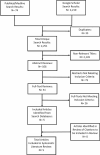Evaluating the efficacy of blister packaging in improving medication adherence within psychiatry: A systematic literature review
- PMID: 40496006
- PMCID: PMC12148011
- DOI: 10.9740/mhc.2025.06.176
Evaluating the efficacy of blister packaging in improving medication adherence within psychiatry: A systematic literature review
Abstract
Introduction: Medication nonadherence is a prevalent and significant public health issue in the United States, particularly among patients with psychiatric disorders. Blister packaging medications is one of the most widely recognized and validated strategies for enhancing medication adherence. Given the paramount importance of adherence in psychiatry and the demonstrated effectiveness of blister packaging in chronic disorders, it is imperative to evaluate its effect in this context.
Methods: A systematic literature review was conducted in PubMed and Google Scholar in May 2024 to identify relevant studies assessing the effect of blister packaging on medication adherence, health outcomes, and health care costs in psychiatry. Studies were included if they provided quantitative data on the effects of blister packaging on medication adherence in psychiatry. A meta-analysis was not performed due to differences in definitions of adherence in the included studies.
Results: The review included 3 clinical studies and 1 cost-utility analysis (CUA). All 3 clinical studies demonstrated that blister packaging improved medication adherence rates. However, minimal data was available regarding its effect on clinical or patient-reported outcomes. The CUA found that blister packaging was dominant (less costly and more effective) compared with standard vial packaging.
Discussion: The evidence presented in this review substantiates the positive effect for blister packaging in a psychiatric population. Nevertheless, due to the limited scope and size of the studies reviewed, further research with larger sample sizes is needed to fully assess the broader effect of blister packaging on clinical outcomes and health care costs within psychiatry.
Keywords: adherence; behavioral health; blister packaging; compliance; health outcomes; medication adherence packaging; mental health.
© 2025 AAPP. The Mental Health Clinician is a publication of the American Association of Psychiatric Pharmacists.
Figures
References
-
- Malik M, Kumari S, Manalai P. Treatment nonadherence: an epidemic hidden in plain sight. Psychiatric Times. 2020;37(3):25-6. Available from: https://www.psychiatrictimes.com/view/treatment-nonadherence-epidemic-hi...
-
- Ghosh P, Balasundaram S, Sankaran A, Chandrasekaran V, Sarkar S, Choudhury S. Factors associated with medication non-adherence among patients with severe mental disorder—a cross sectional study in a tertiary care centre. Explor Res Clin Soc Pharm. 2022;7:100178. 10.1016/j.rcsop.2022.100178 - DOI - PMC - PubMed
Publication types
LinkOut - more resources
Full Text Sources

